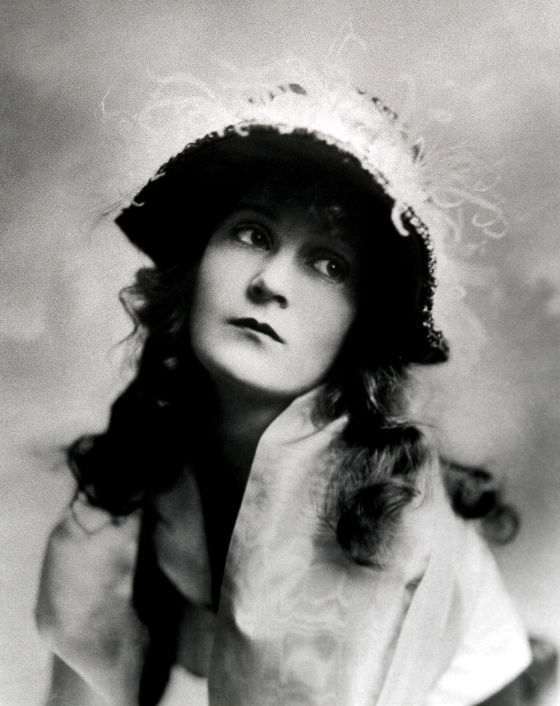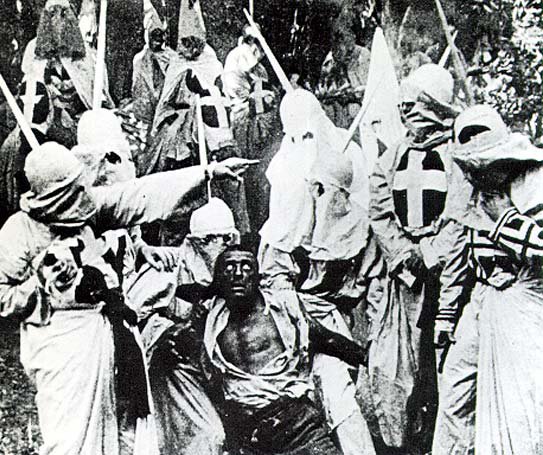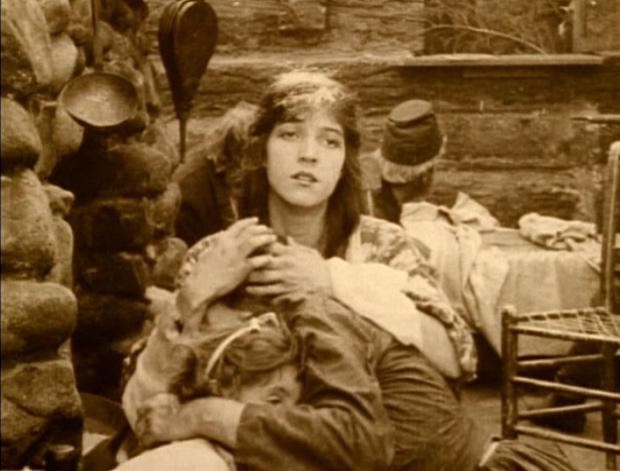
The picture of Reconstruction presented in the second half of The Birth Of A Nation is entirely bogus, but since it represents the views
of respected historians of the time we need to see it as expressing the
environmental racism of 1915. That it did express racism, however, is
beyond doubt. Radical Reconstruction sought to fully enfranchise
Southern blacks and bring them into full political and social equality
with whites. Its ideals were decent, and ones that almost everyone
today would heartily endorse, but it was undoubtedly unrealistic in the
context of Southern society just after the end of the Civil War. And
it wasn't only Southerners who were horrified at the notion of treating
blacks as free and equal citizens. To many, the idea was both
ludicrous and repugnant.
Unwilling to oppose the idea of liberty and equality for all people,
opponents of Radical Reconstruction created a myth about it — that it
was a cynical ploy by unscrupulous Northern whites to maneuver
ignorant blacks into political power and then use that power themselves
to control and plunder the South. Historians, out of a similar
prejudice against blacks, confirmed the myth as fact.
The myth, and the bogus historiography that seemed to confirm it, tried
to disguise an opposition to equality for blacks, but the disguise
comes apart in The Birth Of A Nation, where attempts by blacks to
interact on terms of social equality with whites are presented as
outrages almost on a level with political and judicial corruption.
Henry Walthall's Little Colonel grows steely-eyed when black soldiers
assert their right to walk on the sidewalk in front of his house, when
Silas Lynch offers to shake his hand — his look in those moments is
not so different from the chilling one he gives in reaction to the
death of his sister at the hands of a crazed black would-be rapist.
Earlier, that same sister had reacted with a look of repugnance when
Stoneman's daughter publicly conversed, on perfectly innocent and civil
terms, with the mulatto Lynch.
In such attitudes we see the ugliest side of casual environmental
racism — the nastiness it could provoke when its assumptions were
challenged by “uppity” blacks . . . that is, blacks who presumed to be
entitled to the common respect and dignity accorded to whites.
Indeed, the pathological racism of The Birth Of A Nation can be seen
as a kind of justification for this nastiness, by showing where such
presumption by blacks will inevitably lead — to sexual assaults by
black males on white females, to miscegenation.
This connection is established in the very first scenes of the second
half of the film. In the wake of Lincoln's death and Stoneman's rise
to greater power, Stoneman's maid has now become his social equal,
dressing like a lady and insisting on being treated as one by
Stoneman's associates, though she remains an infantile schemer.
Stoneman states his intention of elevating his protege, the mulatto
Lynch, to full equality with whites — but we are shown what the
consequences of this will be, which Stoneman can't see yet. Lynch
stares lustfully at Stoneman's daughter, foreshadowing his future
pursuit and attempted rape of her. That's what “equality” means to him.
The association of political and social equality for blacks with sexual
designs by black males on white women is carried through the scenes in
South Carolina which follow. We see blacks displaying signs which read
“Equal Rights/Equal Politics/Equal Marriage.” The
drumbeats are clear — the progression apparently inevitable. In the
black-dominated state legislature, the
ignorant, buffoonish black members react with indifference to the
government business being conducted, until a bill allowing
miscegenation is passed, whereupon they direct sexual leers at the
white women in the galleries and then break out in riotous celebration.
A title informs us that this picture of a black legislature was based
on historical photographs, but David Shepard, in his excellent short
documentary on the making of the film, included in the Kino DVD
edition, reveals that it was not — it was based on political cartoons
of the time. Once again, when Griffith wants to inject an element of
psycho-sexual paranoia into his film he adopts a different standard of
historical accuracy than he applies elsewhere.
Black political power is shown as having no legitimate ambitions. It
exists only to enrich or enable the white and/or mulatto manipulators
of the black vote, and to sanction sexual relations between the races.
Even “marriage” is a euphemism here, since blacks are shown as having
no conception of the institution — it just represents a license to
copulate, with or without the woman's consent.

The rise and mobilization of the Klan is presented as a response to the
political and judicial corruption of Southern society by the wicked
carpetbaggers and their ignorant black minions, but its primary
dramatic function is to avenge Gus's attempted rape of the Little
Sister
— by murdering him extralegally — and to save the other white female
principals from attempted rape. Everything, in the end, boils down to
protecting white females from sexual outrages by black males.

In the finale, as former Union and Confederate soldiers and
their women huddle in a remote cabin assaulted by crazed blacks, we
are told that they have united, not in defense of shared American
values, shared ideals of justice and freedom, but “in defense of their
common Aryan birthright”, granted by the “purity” of their Aryan blood,
which is really what is threatened here. The women face the
possibility of rape by the animalistic blacks and the men prepare to
kill them rather than allow that possibility to come to pass. The
“nation” whose birth this film celebrates has almost nothing to do with
the Declaration of Independence or the Constitution — everything to do
with Aryan purity and superiority. It's racist to the core.
The white sheets of the Klansmen in The Birth Of A Nation do not
cover idealists riding to right political and judicial wrongs, despite
a blizzard of intertitles which tell us otherwise. They cover the
beleaguered psyches of 20th-Century males riding to restore their own
insecure manhood.
